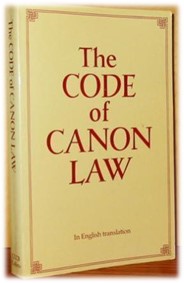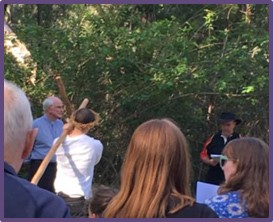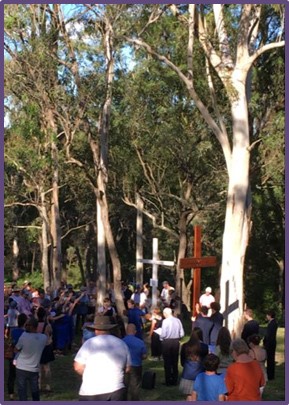I wonder if, over time, we have lost this as our prime focus. Our life here on earth is just part of the journey of our souls, and it is here that we are called to live life completely, so as to enter into eternal glory. When I was growing up, that seemed to be the ultimate purpose of life, and the only way to ensure getting to heaven was to abide by all the commandments and laws of the church. The pendulum, having swung too far in the other direction, has created a more laissez faire situation, in which we rely upon God’s graciousness to have all souls welcomed into the heavenly realm immediately after death. No doubt God has granted us the freedom to choose how we live our lives, and therefore it follows that we are also choosing the journey of our souls beyond death. It may be that, for some, this journey may take some time as they enter more deeply into the Mystery.
 The overall purpose of the Church is the salvation of souls, so Canon Law guides its governance, whereas secular authorities seek the well-being of the citizens. Therefore, it should come as no surprise to find that the overall principles directing Church governance are significantly different from corporate entities.
The overall purpose of the Church is the salvation of souls, so Canon Law guides its governance, whereas secular authorities seek the well-being of the citizens. Therefore, it should come as no surprise to find that the overall principles directing Church governance are significantly different from corporate entities.
Frank Morrisey selected Canons 618 and 619 which respectively relate to the Role of Superiors in Relation to Persons and the Practical Duties of Superiors. Although the two selected canons are addressed directly to superiors in religious institutes, they portray the mindset, or an attitude in relation to good governance of a community. With the appropriate adaptations, they can easily be applied to other persons who, in various ways, exercise leadership positions within the Church.
Frank Morrisey numbers the responsibilities consecutively for ease of seeing what is expected of superiors as they exercise their governance roles and hence what is expected of us in leadership roles.
Canon 618 – Superiors are:
- To exercise their power, received from God through the ministry of the Church, in a spirit of service. Therefore,
- docile to the will of God in fulfilling their function,
- they are to govern their subjects as sons or daughters of God and,
- promoting the voluntary obedience of their subjects
- with reverence for the human person,
- they are to listen to them willingly and
- foster their common endeavour for the good of the institute and the Church,
- but without prejudice to the authority of superiors to decide and prescribe what must be done.
Canon 619 goes on to say that superiors are:
- To devote themselves diligently to their office and together with the members entrusted to them are
- to strive to build a community of brothers and sisters in Christ, in which God is sought and loved before all things. Therefore,
- they are to nourish the members regularly with the food of the word of God and are
- to draw them to the celebration of the sacred liturgy.
- They are to be an example to them in cultivating virtues and in the observance of the laws and tradition of their own institute;
- they are to meet the personal needs of the members appropriately,
- solicitously to care for and visit the sick,
- to correct the restless,
- to console the faint of heart, and
- to be patient toward all.
Canon 618 expresses the major themes running through the 1983 Code: respect for the dignity of each member of the Church. The “power” of people in leadership derives from the ministry of the Church. So leadership is about service, exercising the will of God with reverence, understanding and consultation in order to build up community.
I wonder how we measure up to these principles and how our parishes, schools or agencies are faring.
On Friday, I attended a staff spirituality day at St Joseph’s, Aberdeen. What a wonderful Catholic High School this is. Not only are the teachers committed educators, but they are committed Christians who do not hide God from their students or parents. And each year, they bring a bus load of their students and staff to the annual Way of the Cross. You can imagine this takes great commitment and organising, as well as preparation, as the students create the visual representation of one or more of the Stations. One of the focus questions for the day was ‘what makes an authentic Catholic School’? The vision statement for Catholic Schools is:
At the heart of everything there is always Jesus Christ.
Catholic schools educate:
From and for the community of FAITH
From and for EXCELLENCE in LEARNING
In a rigorous, creative and critical pursuit of TRUTH
 Our experience at Kilaben Bay on Sunday, when more than 200 people gathered to walk the fourteen stations through this beautiful bush setting reminded us that at the heart of everything, there is always Jesus Christ.
Our experience at Kilaben Bay on Sunday, when more than 200 people gathered to walk the fourteen stations through this beautiful bush setting reminded us that at the heart of everything, there is always Jesus Christ.  Students, teachers and parents from a number of our schools and parishes enacted each station as we prayed for ourselves, our church, our community and our world. This year marked the 50th anniversary of the Annual Ecumenical Way of the Cross in the diocese. It began in 1967 at St Joseph’s Lochinvar and remained there until 2007 when it moved to Kilaben Bay for the 2007 Palm Sunday World Youth Day preparation for World Youth Day in Australia 2008. Since then the younger members of our diocesan community have assisted with the Stations of the Cross. I hope you have an opportunity over these coming days to pray the Stations of the Cross and connect with the pain, desolation and courage of Jesus, seeing in his sufferings our own struggle, pain and vulnerability.
Students, teachers and parents from a number of our schools and parishes enacted each station as we prayed for ourselves, our church, our community and our world. This year marked the 50th anniversary of the Annual Ecumenical Way of the Cross in the diocese. It began in 1967 at St Joseph’s Lochinvar and remained there until 2007 when it moved to Kilaben Bay for the 2007 Palm Sunday World Youth Day preparation for World Youth Day in Australia 2008. Since then the younger members of our diocesan community have assisted with the Stations of the Cross. I hope you have an opportunity over these coming days to pray the Stations of the Cross and connect with the pain, desolation and courage of Jesus, seeing in his sufferings our own struggle, pain and vulnerability.
Blessings for you and your families during this Holy Week.

